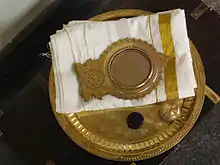Aranmula kannadi
Aranmula kannadi, meaning the Aranmula mirror, is a handmade metal-alloy mirror, made in Aranmula, a small town in Pathanamthitta, Kerala, India. Unlike the normal "silvered" glass mirrors, it is a metal-alloy mirror or first surface mirror or front surface reflection mirror, which eliminates secondary reflections and aberrations typical of back surface mirrors. The exact metals used in the alloy are maintained as a Vishwakarma family secret. Metallurgists suggest that the alloy is a mix of copper and tin [Srinivasan 2008]. It is polished for several days to achieve the mirror's reflective surface.[1] They are considered to be one of the eight auspicious items or "ashtamangalyam" that play a role in the entry of the bride at a wedding venue [3,4]. These unique metal mirrors are the result of Kerala's rich cultural and metallurgical traditions. They have great historical and cultural value and are thought to bring good luck.[1] They are produced by one extended family in Aranmula. The origins of the Aranmula kannadi are linked to the Aranmula Parthasarathy Temple. According to legend, centuries ago the royal chief brought eight families of experts in temple arts and crafts from Tirunelveli district to Aranmula to work on the mirrors in the Parthasarathy temple.



The British Museum in London has an Aranmula metal mirror 45 centimeters tall in its collection.[1] The mirrors received a geographical indication (GI) tag in 2004-05.[2]
See also
References
- "Aranmula mirrors". The Hindu. Kollam, India. 13 July 2012.
- "State Wise Registration Details of G.I Applications 2004-05". India. Archived from the original on 26 August 2013. Retrieved 13 June 2013.